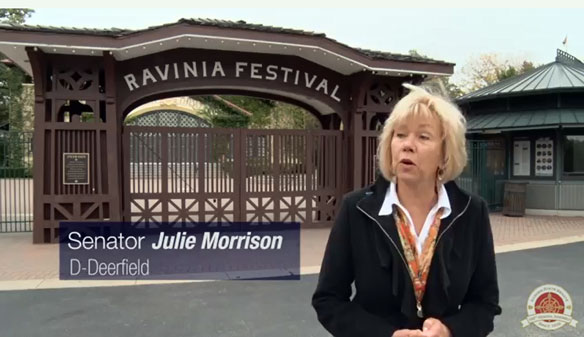Illinois Bicentennial: Pullman Porter Museum
- Details
 On December 3, 1818, Illinois became the nation’s 21st state. As we come to our state’s 200th birthday, we asked senators to talk about people or places in their districts that represent the best of Illinois’ rich past and how that is shown in local history, tourism, culture or community impact.
On December 3, 1818, Illinois became the nation’s 21st state. As we come to our state’s 200th birthday, we asked senators to talk about people or places in their districts that represent the best of Illinois’ rich past and how that is shown in local history, tourism, culture or community impact.
The Pullman community in Chicago is the home of the Historic Pullman District National Monument, where thousands of sleeper rail cars were produced in the mid-to-late 19th century through the first half of the 20th century.
Illinois Bicentennial: Ravinia Festival (VIDEO)
- Details

On December 3, 1818, Illinois became the nation’s 21st state. As we come to our state’s 200th birthday, we asked senators to talk about people or places in their districts that represent the best of Illinois’ rich past and how that is shown in local history, tourism, culture or community impact.
The Ravinia Festival at Highland Park, Illinois, is the oldest music festival in North America. Senator Julie Morrison visited the site in the 29th District where thousands of families have enjoyed all genres of music since 1904. Along with entertainment in a beautiful setting, Ravinia plays a vital part in the local economy and provides hundreds of jobs.
Artist of the Month - Amanda Evanston
- Details

Amanda Evanston is the November Artist of the Month. She is from Evanston, and her favorite medium to use is acryclic paint.
How long have you been an artist or when did you start? Was there a single incident or moment when you realized this was your passion and if so, would you tell us about it?
Painting has always been with me. Always. My first memory is finger painting in the bath tub. My first friend was a lunchbox filled with art supplies. I was never the smartest or the prettiest or the funniest kid, but I could draw stuff for hours and my parents were kind enough to encourage the habit.
When I paint I can feel my cells shift. There’s nothing like it. I’m fortunate enough to live in a time and place where I get to do it every single day.
Fona International Named One of America’s Top Workplaces
- Details
 Illinois is home to one of the nation’s best workplaces for manufacturing and production, according to a new report from Fortune magazine.
Illinois is home to one of the nation’s best workplaces for manufacturing and production, according to a new report from Fortune magazine.
Fona International, a Geneva-based food and beverage manufacturer, ranks third on Fortune’s 2018 list of “The 20 Best Workplaces for Manufacturing and Production.”
Founded in 1987, Fona employs more than 200 people in Illinois. Among Fona employees, 96 percent say the company is a great place to work.
Fortune’s rankings are compiled by surveying employees from companies throughout the country on their experiences in the workplace.



